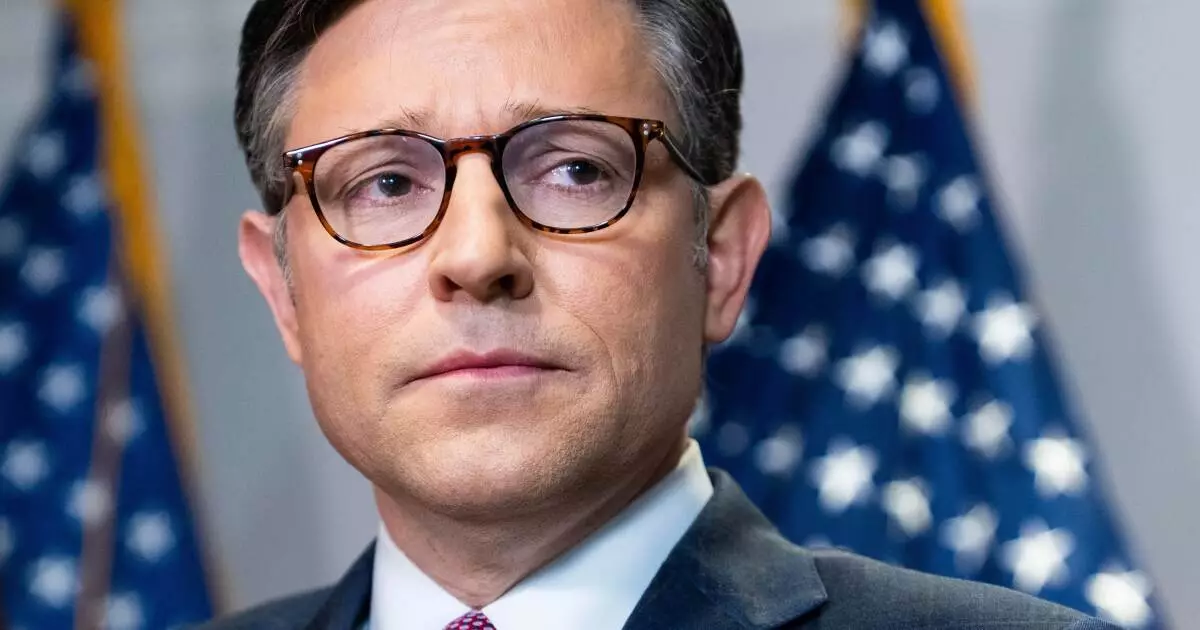The ongoing saga within the House of Representatives offers a compelling look at the gridlock that often plagues U.S. governmental processes, especially when appropriations and legislative priorities collide. As House Republicans grapple with critical proposals that link the maintenance of government operations to voting regulations, the potential consequences stretch beyond Washington, illustrating the profound impact of political disagreements on local governance.
At the heart of the current conflict is the “Safeguard American Voter Eligibility Act,” which aims to create stringent safeguards against non-U.S. citizens participating in presidential elections—an act already deemed unnecessary since the practice is illegal. House Speaker Mike Johnson of Louisiana champions this effort, emphasizing its significance to the members of his party. He views this legislation as one of the pivotal votes in their career, highlighting the perceived urgency of the issue. However, this conviction is met with skepticism from within his own ranks, particularly among conservatives keen on securing increased military funding amidst a wider debate over financial resources. The scheduled vote, originally set for Wednesday afternoon, was abruptly pulled from the agenda as opposition mounted, illustrating the fractious nature of intra-party politics.
The ramifications of a possible government shutdown extend well beyond the Capitol, striking at the very heart of local governance. Officials from national associations representing counties and cities stress that local authorities depend heavily on federal resources to sustain their operations. Nicole Weissman, representing the National Association of Counties, underscores the interconnectedness of federal funding with municipal revenue streams. With nearly one-third of county revenue sourced from intergovernmental funding, a funding freeze could have dire consequences for essential local services and projects.
Irma Esparza Diggs further elaborates on the bureaucratic red tape involved in accessing those federal funds. Many local governments initially finance projects upfront, awaiting reimbursement from federal agencies. A shutdown could disrupt these reimbursement systems, forcing local governments to shoulder burdensome debts, thus risking delays in public projects and services. This unfunded liability becomes a critical issue as municipalities strategize their budgets and service delivery amid uncertainty.
Against this backdrop comes the proposal for a six-month continuing resolution, a temporary funding measure aimed at maintaining current spending levels through March 2024. While the $1.6 trillion proposal enjoys the backing of figures like former President Trump, its approach signals a cautious path forward for legislators wary of a complete funding freeze. The strategy seems particularly prudent in light of potential shifts in political leadership, as changes in the presidency or congressional makeup could alter spending priorities come January 2025.
The convoluted appropriations cycle, every year beginning with the presidential budget proposal due in February, underscores the challenges of timely funding. The push and pull within Congress often leads to unexpected changes in where funds ultimately are allocated, as emergency situations and political compromises dictate new budgetary directions. The fall of former Speaker Kevin McCarthy illustrates the volatility of such conversations, where substantive issues like military aid and domestic budget cuts can derail discussions, further complicating the budgeting landscape.
As Congress navigates this precarious path characterized by political infighting, the implications of a shutdown loom large, particularly for local governments reliant on federal support. The interplay between legislation, government operations, and local funding creates an intricate web of dependencies that can quickly unravel in times of political strife. Ultimately, the current crisis underscores the necessity of effective governance, where balancing political agendas with the needs of constituents remains an ongoing challenge. As all parties strive to stabilize funding and ensure the continuity of essential services, the stakes could not be higher—both for the legislators caught in the fray and the communities that rely on their decisions.

